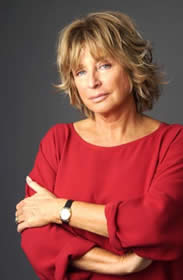 Danièle Thompson, the French film director and screenplay writer, is daughter of Gerard Oury, a film director and Jacqueline Roman, an actress. La Grande Vadrouille (1966) was her first movie as a writer. In the seventies, Danièle and Marcel Jullian worked together to write nine screenplays that were directed by Gerard Oury, Daniele’s father. In 1975, she wrote the script for Jean-Charles Tacchella’s Cousin, Cousine together with him and this movie was nominated for an Academy Award.
Danièle Thompson, the French film director and screenplay writer, is daughter of Gerard Oury, a film director and Jacqueline Roman, an actress. La Grande Vadrouille (1966) was her first movie as a writer. In the seventies, Danièle and Marcel Jullian worked together to write nine screenplays that were directed by Gerard Oury, Daniele’s father. In 1975, she wrote the script for Jean-Charles Tacchella’s Cousin, Cousine together with him and this movie was nominated for an Academy Award.
After working on comedies for television in the eighties, she wrote a number of dramas that were directed by Claude Pinoteau. In the nineties the two movies that she had written, La Reine Margot and Those Who Love Me Can Take the Train, both got Cesar nominations.
She began her career as a film director in 1999 by directing La Buche, which she also wrote cooperatively with her son, Christopher Thompson. Her second movie as a director was Jet Lag and her last movie Avenue Montaigne / Fauteuils d’Orchestre is the official French entry for Academy Award consideration.
Synopsis:
In Avenue Montaigne / Fauteuils d’Orchestre Jessica, a young girl, arrives in Paris dreaming to become famous and rich. She finds a job in a small Café that is a point of intersection of all kinds of people from different social backgrounds. As a waiter, she gets to know the three main characters of the movie: Catherine, a wealthy and popular soap opera actress; Jean-Francois, a well known piano prodigy; and Jacques, an artwork collector.
All of these characters are facing the same turning points on March 17th in their lives. Catherine while preparing for a Feydeau farce that will open on March 17th 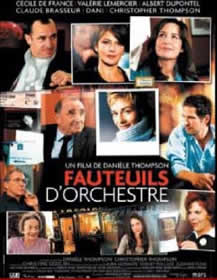 is looking to change her career and find a part in an intellectual film. Jean-François, who is unhappy and wants to be left alone, has to get ready for a major Beethoven recital on the 17th. Jacques’ big achievement in life was to work hard and spend everything he has to collect extraordinary paintings and sculptures but he is planning to sell everything he has in an auction the 17th.
is looking to change her career and find a part in an intellectual film. Jean-François, who is unhappy and wants to be left alone, has to get ready for a major Beethoven recital on the 17th. Jacques’ big achievement in life was to work hard and spend everything he has to collect extraordinary paintings and sculptures but he is planning to sell everything he has in an auction the 17th.
Bijan Tehrani: Avenue Montaigne / Fauteuils d’Orchestre has a very unique structure. It has some touch of the old Middle Eastern story telling. Is this true?
Daniele Thompson: Well I guess in our European education we are confronted with this sort of story telling. I remember as a child I had a teacher who, once a week, would read us something like the Iliad or the Odyssey and these things were very much a part of our education and the way we are taught to appreciate literature and I guess it’s something we have inside of us in a way. Don’t you think so?
Bijan: Yes, I believe exposing young children to the world of literature has helped French artists have a broader view of the world.
Your film has many layers and somehow has a documentary feel, but not a documentary look. Avenue Montaigne has a 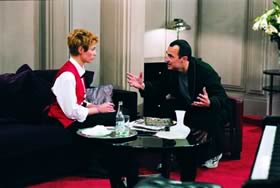 deep look inside the life of three people dealing with art, this is where the movie finds its documentary touch. But what takes it to a different level is the same date, the same deadline that those characters share. How did you decide to use this idea for your film?
deep look inside the life of three people dealing with art, this is where the movie finds its documentary touch. But what takes it to a different level is the same date, the same deadline that those characters share. How did you decide to use this idea for your film?
Daniele: Well, we started with a basic idea, one night I came out of Theater Des Champs Elysées which is as you know a place where Parisians go. It has been built in 1913 and it’s a beautiful place and there are places like this and the opera or the Eiffel tower where you get used to see it so much that you don’t look at it anymore. So, one night I was there for a concert and I did look at it a different way—I suppose I was looking for an idea for my new film—I looked around and I thought that this is much more beautiful than I ever thought it was. Then we came out and tried to get a table at the Café across the theater, where I have been all my life as this little café is an institution in Paris. It’s absolutely true when it is said in the film that this is one of the only places left that hasn’t 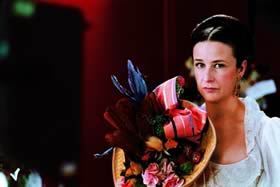 been kicked out by Valentino or Chanel or other luxurious shops. It is the only place left where anybody can go and get a cup of coffee or glass of wine or whatever. So I thought, “This is a very special place!” and people that even come here from work they all mix together. It is so true of the big cities everywhere that people look alike. People that go to a café at the corner of a street they work around the same area and they come from the same background. If you are lucky and you live in a lovely area, you have people that are lucky like you in your Café and if you live in a terrible suburb everyone will be from the same suburb. But that is not the case in this Café. People do mix. You have the doorman, millionaires, and people fixing the light, the big pianists, and people from all over the world that go to that café to have some fries or coffee or whatever. That night I thought that I might talk about these people. I talked to my son Christopher and said that
been kicked out by Valentino or Chanel or other luxurious shops. It is the only place left where anybody can go and get a cup of coffee or glass of wine or whatever. So I thought, “This is a very special place!” and people that even come here from work they all mix together. It is so true of the big cities everywhere that people look alike. People that go to a café at the corner of a street they work around the same area and they come from the same background. If you are lucky and you live in a lovely area, you have people that are lucky like you in your Café and if you live in a terrible suburb everyone will be from the same suburb. But that is not the case in this Café. People do mix. You have the doorman, millionaires, and people fixing the light, the big pianists, and people from all over the world that go to that café to have some fries or coffee or whatever. That night I thought that I might talk about these people. I talked to my son Christopher and said that  it’s probably a fascinating story to tell about people who mix and are never supposed to mix; people that are never supposed to speak together but they do because of that area. So we started to work on this idea and slowly the idea of the characters having a turning point in their lives came to us. We did not limit this to only the three main characters, but literally practically everybody in the film is at a turning point. It’s hard to say how it suddenly came out; it’s almost like a diamond that is all rough and dark and black but suddenly you start to clean it and you start to realize what color it is and what color comes out and that is exactly what happened. We decided to write a comedy about un-satisfaction. About never feeling that you are in the right place and always feeling that you would be better back where you were or somewhere else, or that you work too much or too little. Not being satisfied finally came out as the basic subject, but there were other subjects as well. You know, it was like a solving a puzzle when trying to figure out what we wanted to talk about in this film.
it’s probably a fascinating story to tell about people who mix and are never supposed to mix; people that are never supposed to speak together but they do because of that area. So we started to work on this idea and slowly the idea of the characters having a turning point in their lives came to us. We did not limit this to only the three main characters, but literally practically everybody in the film is at a turning point. It’s hard to say how it suddenly came out; it’s almost like a diamond that is all rough and dark and black but suddenly you start to clean it and you start to realize what color it is and what color comes out and that is exactly what happened. We decided to write a comedy about un-satisfaction. About never feeling that you are in the right place and always feeling that you would be better back where you were or somewhere else, or that you work too much or too little. Not being satisfied finally came out as the basic subject, but there were other subjects as well. You know, it was like a solving a puzzle when trying to figure out what we wanted to talk about in this film. 
Bijan: Does Jessica represent the younger generation in France that is interested in art?
Daniele: She represents youth in a sense that she is a simple person; she is not a very educated person. She is not Parisian, she is from the middle of France and so she doesn’t have any snobbism about the way she sees things and judges them and everybody else is not like her. In the film, one of the main subjects is how people judge and what is better to admire, what is chic or what things are considered popular culture. Is it nobler actually to love Beethoven more than Charles Aznavour? Or it is better to admire Shakespeare than admiring Feydeau? Is it really that bad to be a television actress and nobody wants to work with you because you have “TV” written on your forehead and nobody wants to give you a part in an intellectual movie about Simone de Beauvoir? It has to do with what culture really is about and why people put you in a category: you are an intellectual, or you are a  popular writer, or you are shit or you are incredibly appreciated by a crowd writing things that nobody else understands. So this film is about that and you will see it very much throughout the characters and the actress and the way she wants to be in that Sidney Pollack film about Simone de Beauvoir and how she is rejected. Jessica, the young girl has no preconceived idea about all these. So through her, we can go in this story without naivety because she isn’t a naïve person, she is very fresh and very open.
popular writer, or you are shit or you are incredibly appreciated by a crowd writing things that nobody else understands. So this film is about that and you will see it very much throughout the characters and the actress and the way she wants to be in that Sidney Pollack film about Simone de Beauvoir and how she is rejected. Jessica, the young girl has no preconceived idea about all these. So through her, we can go in this story without naivety because she isn’t a naïve person, she is very fresh and very open.
Bijan: Is the Café in the movie, the hangout spot for all the characters of your film, a symbol of the world that we are living in?
Daniele: It symbolizes a mixed place. A place where everybody is welcome and more and more also we can see that these places get rarer and rarer. If you are dressed in a very eloquent way and you walk into a café in a poor suburb, you are terrified and people look at you as if you are a murderer; if you work in the street and you are in uniform, if you walk into the chic hotels, people won’t even let you sit anywhere to have a cup of coffee. There are limits and doors are not opened for everybody and that little café symbolizes a place where these negative things don’t exist.
Bijan: There are issues shared in all the three movies you have directed. In your first film, La Buche, the three sisters have 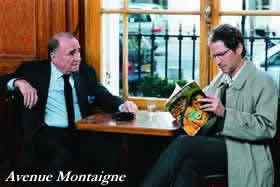 totally different lives and they cross paths because they are sisters and come together around their mother. In Jetlag, the two main characters happen to be trapped in the same airport and have to share their time together. In Fauteuils d’Orchestre, the characters congregate in a café and come together and share the same space. In your movies, the characters that have never met before or don’t have a relationship with each other come together and share spaces together. Is this the main theme of your movies?
totally different lives and they cross paths because they are sisters and come together around their mother. In Jetlag, the two main characters happen to be trapped in the same airport and have to share their time together. In Fauteuils d’Orchestre, the characters congregate in a café and come together and share the same space. In your movies, the characters that have never met before or don’t have a relationship with each other come together and share spaces together. Is this the main theme of your movies?
Daniele: Well, my movies are very much about people. They are not war movies or gangster stories where people move a lot and travel and fly all over the world. They are very much about people and being close to people. So I guess it’s an instinct more than something I’ve been thinking about. I guess at least in my first three movies there is a unity of time and unity of place that creates the description of character, their feelings, and their crisis. You know what all my films have in common is that they are all comedies, I hope, because people laugh watching them. They are all about people who are desperately unhappy for some reason or another; or I guess we all are, depending on which way we suddenly look at life. But everybody carries a whole bunch of things inside, like pains and anxiety. So these things are inside of us and people make their way through life trying to survive with minutes of happiness here and there. Basically, we are not well, let’s face it! (Laughs). 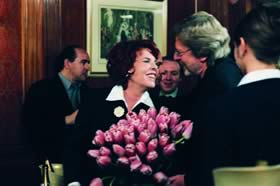 Nobody, nobody is well! Therefore a story that takes place in 1 day or 3 days or a few days before Christmas or a day and a half at the airport, or in case of this movie 3 days before the 17th of March— suits me because you can try to really get close to people in a short time and discover a lot about them in a short time. And it’s true that for the moment I have not yet found an interesting whole story of a life time. Funny enough, when I saw “Brokeback Mountain” last year, (which I loved), at the beginning I thought that this story would end at the end of summer. My thought was ridiculous, because it turned out to be life time story and I loved that.
Nobody, nobody is well! Therefore a story that takes place in 1 day or 3 days or a few days before Christmas or a day and a half at the airport, or in case of this movie 3 days before the 17th of March— suits me because you can try to really get close to people in a short time and discover a lot about them in a short time. And it’s true that for the moment I have not yet found an interesting whole story of a life time. Funny enough, when I saw “Brokeback Mountain” last year, (which I loved), at the beginning I thought that this story would end at the end of summer. My thought was ridiculous, because it turned out to be life time story and I loved that.
Bijan: It’s true that it’s always easier to get deeper into the characters if you focus on a slices of life rather than a whole lifetime story of generations.
Daniele: I guess so, I guess so.
Bijan: How do you see the French cinema today compared to the days of the New Wave?
Daniele: Well, the new wave is a strange phenomenon because for a while it gave birth to a few wonderful movie makers, but only a few, Godard, Truffaut and a few others. In the meantime, it killed the screenwriters in France because suddenly you didn’t have to tell a story anymore, you just had to move around with the camera and try to show everything through your camera. And slowly, it became very damaging and people started really started preferring American films and we had a really rough moment a few years ago. French cinema now is back in telling stories. Even though we don’t have the same financial ways that you have in America and therefore we don’t do that many spectacular films as are done in America. As the result we are very good at telling everyday stories, stories about people and their feelings. Still now there is definitely a great return to storytelling.
Bijan: Can you talk about any of your future projects?
Daniele: It’s very hard to talk about it now because I have just literally started working on it like a week ago. So it’s too early. It’s as if you were to ask me 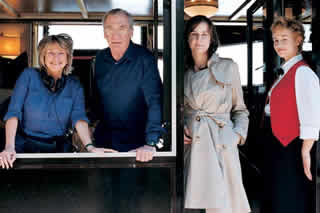 about this one at the stage where I just got out of the café and decided that I wanted to tell a story about this part of Paris.
about this one at the stage where I just got out of the café and decided that I wanted to tell a story about this part of Paris.
Bijan: Who are the filmmakers that you admire?
Daniele: Oh my god (laughs)! Well, I love Truffaut, I love Roman Polanski, I love Capra and Lubitch and Chaplin, Billy Wilder, Woody Allen, Vitorio De Sica, Ettore Scola, Orson Wells….(laughs) there are so many that I admire! Sidney Pollack, who is in my film and he is also my friend and I admire him greatly for his work as a director. You know, it’s an extraordinary feeling for people who are in movies to admire other moviemakers because you come out of their films always enthusiastic and enchanted and also with a little bit of jealously. Where you think, “Oh my god, I will never be able to do that!” It’s happened to me many times where I came out of a Scorsese or a Woody Allen film thinking that this was so good and you feel so good but there is always something that makes your heart a little squeezed because you think that you will never be able to produce something like what they do.
Bijan: I think after watching Fauteuils d’Orchestre, Scorsese or Woody Allen may have the same feeling. Thanks for the opportunity to talk to you.
